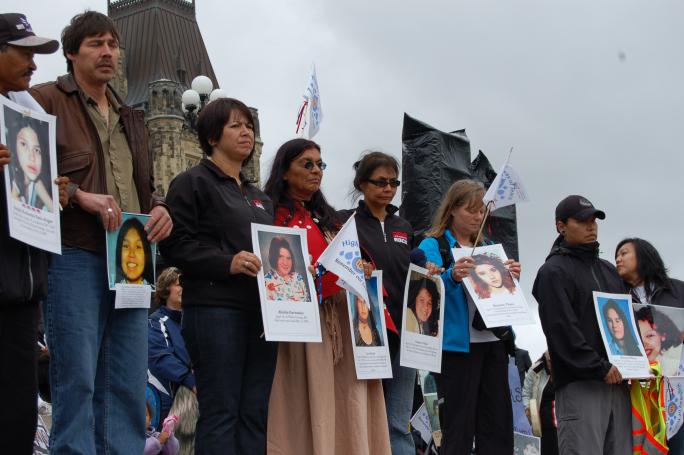
OTTAWA — Most Canadians agree that the murders and disappearances of Indigenous women amount to genocide, a new poll suggests.
But the Leger poll also suggests there’s disagreement about when it occurred and who is responsible.
Fifty-three per cent of respondents agreed with the national inquiry into missing and murdered Indigenous women and girls, which last week concluded that the tragedy is part of an “ongoing genocide” that has been centuries in the making. Another 34 per cent disagreed.
But there was little consensus about what form that genocide took, with respondents citing everything from Europeans giving Indigenous People blankets infected with smallpox to the current-day scandal involving the forced sterilization of Indigenous women.
Among the top responses, 17 per cent blamed colonization and the loss of Indigenous lands to European settlers, 15 per cent blamed church-run residential schools and another 15 per cent pointed to the destruction of cultural identity and forced assimilation. Just three per cent blamed racism broadly.
As to who is responsible for the genocide, 32 per cent blamed Canada’s British and French founders and 25 per cent blamed Catholic and Protestant churches. Another 21 per cent said all Canadians share responsibility for the injustice while just one per cent blamed government.
The poll of 1,528 Canadians who were randomly recruited from Leger’s online panel was conducted from June 7 to 10 for the Association for Canadian Studies. Polling experts say online surveys cannot be assigned a margin of error because they do not generate a random sample of the population.
Association president Jack Jedwab said the survey results suggest that the inquiry report has generated confusion about what genocide means and gives credence to those who’ve argued the report dilutes the grave meaning of the word.
“A lot of people seem to me in the poll confused, even if they acknowledged in the majority that, yes, there’s some genocide that’s occurred. But what the nature of it is, by whom it’s been committed, what it means, is it residential schools, is it expropriation of lands … it’s turning the term ‘genocide’ into a bit of a catchall for a lot of Canadians,” he said.
Jedwab’s concern was underscored by another finding in the poll: 71 per cent said they’re proud of Canada’s history, including 53 per cent of those who strongly agreed with the finding that Indigenous women have been victims of genocide.
“There seems to be like some gap here, a disconnect in terms of how severe and serious the committing of a genocide is,” he said.
Respondents were asked to describe in one sentence what they think of when they hear the term ‘genocide.’ About 30 per cent offered some variation on the idea of extermination or mass killing of a specific group of people. Four per cent mentioned the Holocaust, two per cent mentioned Rwanda, three per cent said mass death and one per cent cited wars. Two per cent referred specifically to the treatment of Indigenous Peoples, including missing and murdered Indigenous women.
The national inquiry issued a supplementary report explaining why commissioners felt justified in using the term ‘genocide’ to describe the accounts of missing and murdered Indigenous women and girls. It argued that the word can’t be confined strictly to time-limited, state-sponsored mass murder of specific groups, such as Nazi Germany’s extermination of six million Jews.
“It is time to call it as it is: Canada’s past and current colonial policies, actions and inactions towards Indigenous Peoples is genocide,” the report said.
“The insidious and gradual nature of the obliteration of Indigenous peoples, and the lack of a uniform national policy spearheaded by a totalitarian mastermind, differentiate colonial genocide from our traditional understanding of what constitutes a genocide.
“These distinguishing factors have, unfortunately, allowed the Canadian consciousness to dismiss Canada’s colonial policies as racist and misconceived, rather than acknowledge them as explicitly genocidal and, even, ongoing.”
The report has caused discomfort for federal political leaders. Prime Minister Justin Trudeau said he accepted the report’s findings but did not repeat the word “genocide.” He later did specifically accept the genocide finding but then suggested it would have been more appropriate to refer to “cultural genocide” instead.
Conservative Leader Andrew Scheer has said the disappearances and deaths of Indigenous women is a tragedy but “does not fall into that category of genocide.”
There are potential legal consequences to accepting the use of the term genocide, which is a crime in international law. The Organization of American States has said it wants to create a panel to investigate the finding that Canada’s Indigenous women have been the victims of genocide.